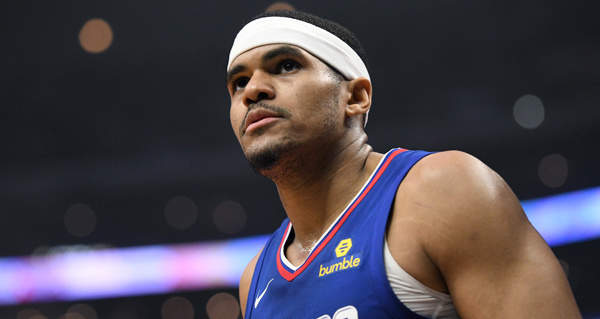It’s not something NBA executives like to talk about, but most of them are waiting out the Warriors. This isn’t a blatant thing, and it’s not like the Atlanta Hawks have a series of superteam-creating moves available to them that they’re not making, but you can see, among the league’s rebuilding and middle classes, that nobody is terribly eager to go all-in, to mortgage the future for the sake of competing today. This is prudent enough—what in a normal league would be an outside shot at a championship is, in 2019, effectively a guaranteed playoff exit somewhere down the line. If you build a team that’s merely “nice,” they have next to no shot against Golden State. What’s the purpose of extending yourself if it’s almost definitely not going to get the job done?
Which is to say it’s a pleasant surprise to see the Sixers really going for it this year by bringing in Jimmy Butler and, just Wednesday morning, Tobias Harris, shedding some draft picks and young talent in the course of constructing a formidable starting five of Butler, Harris, Ben Simmons, J.J. Redick, and Joel Embiid. Harris, in particular, is an interesting figure because his route to this destination has been so circuitous—and primarily beyond his control.
Harris was drafted in 2011 by Charlotte, then immediately dealt to the Bucks. In the middle of the 12-13 season, Milwaukee sent him to Orlando, and in the middle of the 15-16 season, Orlando sent him to Detroit. He was the most enticing part of a package that brought Blake Griffin to the Pistons last year, and now he’s a signal that the Clippers are reorganizing and the Sixers mean serious business. Harris has still never truly gotten to pick the team he’s played for—he hits unrestricted free agency for the first time this summer—but we can assume he’ll be happy to play a part in what he hopes will be a deep and fruitful playoff run for a team that has probably become the Warriors’ number one rival overnight.
A longtime member of the I’ve Always Liked That Guy All-Stars, after drifting around the league for six-and-a-half seasons, Harris is finally being given a chance to show what he can do playing consequential basketball. He’s participated in only four playoff games in his career, and those were for an eight-seed Pistons squad that was dispatched easily by LeBron’s Cavs. This here with Philadelphia is a genuine opportunity to do some meaningful work, and the situation suits him perfectly. Harris had been leading the Clippers in shot attempts per game and carrying the bulk of the offensive workload alongside Danilo Gallinari and Lou Williams. With the Sixers, he’ll clearly be the third or fourth option. This does mean he’ll suffer from Kevin Love Syndrome, in that he’ll be occasionally underutilized, acting as nothing more than a floor-spacer on some possessions, but he’ll also get to participate in two-man sets with Simmons and Butler, and if Brett Brown can get his rotations right, there should be a couple periods of each game in which Harris is allowed to attack his matchup from the block or the elbow.
One of the more intriguing aspects of what we could call the NBA’s superteam era has been watching the league’s various star combinations—P.G. and Russ in Oklahoma City, Paul and Harden in Houston, Kawhi and Lowry in Toronto, the late LeBron-Love-Kyrie triumvirate in Cleveland—figure out how to play with each other. This isn’t a novel point, but what has made the post-Durant signing Warriors indomitable is that their four stars fit together almost perfectly. Steph can light it up, but he’s also a willing passer. Klay is fine getting most of his points off catch-and-shoots. Draymond is a defensive swiss army knife and excellent playmaker. And Durant can do just about everything. The talent is the most important factor in their success, and it’s what they bludgeon lesser teams with on nights when they’re off their collective game, but the synergy is what makes Golden State transcendent.
You can argue about whether or not Harris is a star, but he is at least very good, and on the surface, quite well-equipped to assume a secondary or tertiary role as well as stepping up and carrying the team when necessary. He’s been an excellent shooter over the past two seasons, and nobody will confuse him with prime Pau Gasol, but he can pass his way out of a double team. With Embiid behind him and Butler and Simmons on the wing, his lackluster defense will be mitigated. It’s going to take some time for Harris to get used to having less of the ball than he did in Los Angeles, but he’s been a role player before; hopefully he’ll settle back into that rhythm quickly. Elton Brand and company are likely operating on the Daryl Morey principle of getting the talent now and figuring out the chemistry later, but on paper, it looks like Harris will be able to provide the former without screwing up the latter. He’s undeniably skilled, but he’s also the right kind of player. At any rate, he’s a hell of a lot better than Wilson Chandler.
These are exciting times in Philadelphia, The Process’s abstruse theoreticality giving way to an actual basketball team that’s trying to pull off the spectacular. It must be doubly exciting for Harris, who’s arriving to the big time not a moment too soon. Together, he and his new Sixers teammates might be able to win the whole thing. And that is the point of all this—striving, perhaps beyond your means and with some reckless abandon, for a championship. Now Harris, who’s been wandering for a while, and Butler and Embiid and Simmons and the rest, get to give it an honest effort.



